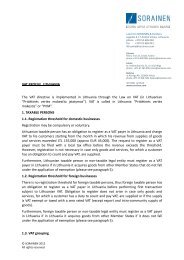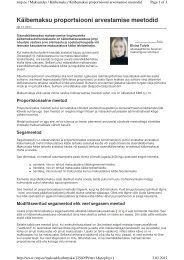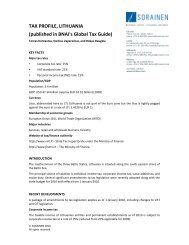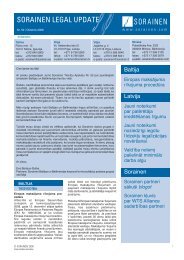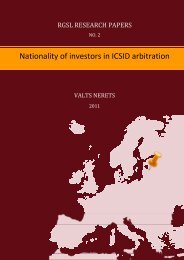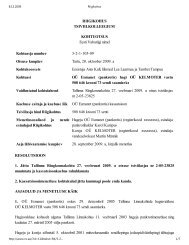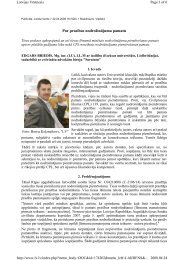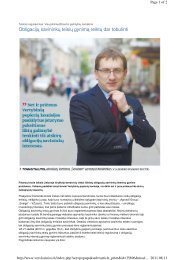Employee Share Plans in Europe and the USA - Sorainen
Employee Share Plans in Europe and the USA - Sorainen
Employee Share Plans in Europe and the USA - Sorainen
Create successful ePaper yourself
Turn your PDF publications into a flip-book with our unique Google optimized e-Paper software.
<strong>Employee</strong> <strong>Share</strong> <strong>Plans</strong> <strong>in</strong> <strong>Europe</strong> <strong>and</strong> <strong>the</strong> <strong>USA</strong>Germanyunder an employee share plan are deemed to be part of <strong>the</strong> employmentrelationship with <strong>the</strong> employ<strong>in</strong>g company, <strong>the</strong>n <strong>the</strong> share plan rules will beconsidered "general terms" (Allgeme<strong>in</strong>e Geschäftsbed<strong>in</strong>gungen) fall<strong>in</strong>g with<strong>in</strong><strong>the</strong> scope of terms that may be reviewed by <strong>the</strong> Labour courts. Companiesshould seek specific advice on <strong>the</strong>se issues <strong>and</strong> o<strong>the</strong>r employment law issueswhich may be applicable.9.3 Under <strong>the</strong> "German Act on <strong>the</strong> Adequacy of Directors' Remuneration", <strong>the</strong>m<strong>in</strong>imum vest<strong>in</strong>g period for share options granted by a German public companyto its directors <strong>and</strong> employees has been <strong>in</strong>creased from two to four years. Theremuneration of directors of German public companies must be oriented towardslong-term success <strong>and</strong> be based on long-term <strong>in</strong>centives for susta<strong>in</strong>ablebus<strong>in</strong>ess development. Consequently, shares granted to such directors shouldbe conditional upon a hold<strong>in</strong>g period of at least four years, <strong>and</strong> phantom optionsor similar awards should also only reward directors based on comparably longtermstock-exchange rate <strong>in</strong>creases.10. Consumer Protection LawIn accordance with German consumer protection law, consumers have a right ofrevocation <strong>in</strong> relation to contracts concluded <strong>in</strong> certa<strong>in</strong> situations where <strong>the</strong>consumer is "taken by surprise" or where <strong>the</strong> consumer may make imprudentdecisions (e.g. doorstep transactions, distance sell<strong>in</strong>g transactions). Inaccordance with general case law, employees qualify as consumers, <strong>and</strong> if <strong>the</strong>yenter <strong>in</strong>to transactions at <strong>the</strong>ir place of work, this may, depend<strong>in</strong>g on <strong>the</strong>circumstances, qualify as a doorstep transaction lead<strong>in</strong>g to right to revocation for<strong>the</strong> employee/consumer.The general revocation period is two weeks. However, if <strong>the</strong> consumers are not<strong>in</strong>formed that <strong>the</strong>y have this right to revocation, <strong>the</strong>n such right will not expire. Ifrevocation occurs <strong>the</strong>n <strong>the</strong> whole transaction would have to be unwound.Although it is arguable that participation <strong>in</strong> an employee share plan would not fallwith<strong>in</strong> <strong>the</strong> scope of consumer protection law, it is considered advisable to provide<strong>in</strong>formation on <strong>the</strong> right of revocation so as to avoid <strong>the</strong> possibility of <strong>the</strong> right ofrevocation last<strong>in</strong>g beyond <strong>the</strong> two week period.UK/1729295/03 86 September 2010



